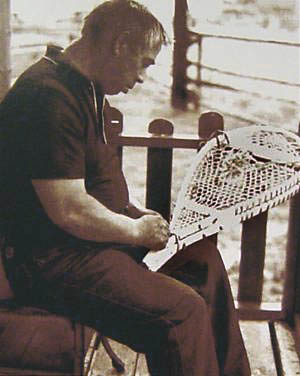Contemporary Snowshoes
Details:
1. Mistassini Cree Classic Beavertail Snowshoes
Loaned by Bill Mackowski, 2002
2. Ojibwe Bush Snowshoes
Loaned by Bill Mackowski
3. Mushu Innu Bearpaw Snowshoes
Loaned by Bill Mackowski
4. Musquara Run Innu Elbow Shoes
Loaned by Bill Mackowski
5. Misstassini Cree Hunting Snowshoes
Loaned by Bill Mackowski
6. Montaignais Swallowtail Snowshoes
Loaned by Bill Mackowski
7. Cree Snowshoes
Loaned by Bill Mackowski
The ability to make traditional wood frame and hide-laced snowshoes is an endangered tradition. Passed on for thousands of years by mothers and grandmothers to daughters and from fathers and grandfathers to sons, snowshoemaking has been undermined by the introduction of new technologies and goods and the encroachment of non-native settlements on traditional hunting territories. Despite these changes in traditional culture, a few elders still carry on traditions learned in their youth. In Maine, Larry Roubichaud, Maliseet, seeks to revive snowshoemaking and in sub-Arctic Canada, Innu, Mistassini Cree, Montagnais, Naskapi and Attikamek elders continue to make snowshoes and pass this tradition on to the next generation. No longer learned in the bush, snowshoemaking is often taught as part of school curricula. Most of the contemporary pairs exhibited here will never touch the snow. Made in traditional ways with traditional materials, they are valued for their artistry and for their ties to the past when snowshoes were indespensable to life in the Northeast.

Damien Benoit of Conne River
constructing a pair of snowshoes.
Courtesy of the Provincial Museum of Newfoundland and Labrador
